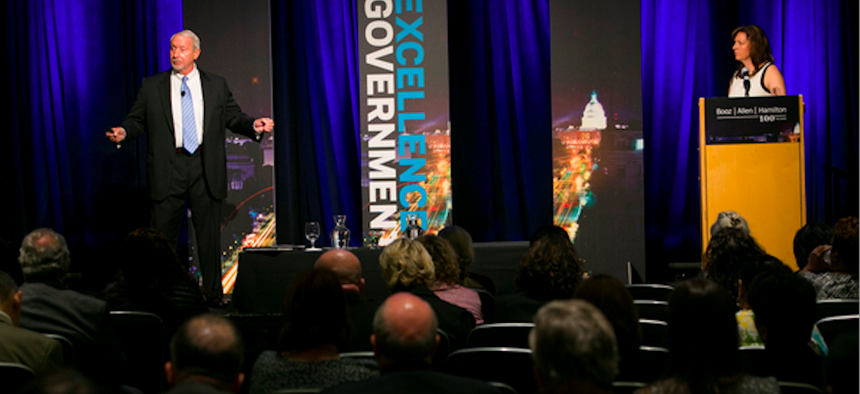
Photo by Kristoffer Tripplaar
A New Framework for a Troubled Civil Service
The civil service system for hiring and managing federal employees is quickly becoming obsolete. A new report presented at Excellence in Government 2014 explains why and offers a model for structural reform.
The American federal civil service system is increasingly outdated and needs structural reform to compete with the private sector for in-demand talent. That’s the central message presented by Booz Allen Hamilton Vice President Ron Sanders and Partnership for Public Service Vice President of Communications and research Lara Shane at Excellence in Government 2014. Presenting high-level findings from their new report, Sanders and Shane described how the civil service, as currently structured, is simply no longer competitive with the private sector. Federal employee pay is disconnected from the broader labor market, agencies too often fail to reward excellent performance and address poor performance, and the civil service system has become balkanized, with some agencies receiving special exemptions from Congress to better compete in the labor market.
Sanders and Shane proposed establishing a unified civil service system based on five tried and true government hiring and management principles - merit-based decision-making, nonpartisanship, veterans preference in hiring, non-discrimination, and due process - as the core of their report’s reform package. Beyond these core principles, the new civil service framework has a common base of hiring and management procedures and standards for all agencies and agency-specific configurations as needed to ensure flexibility. Some more specific recommendations include
- Simplifying the job classification system to more closely mirror fields of expertise.
- Creating a market-sensitive compensation system
- Adopting an incentives-based performance management model
- Expanding flexibility in hiring to all agencies, and holding managers accountable for attracting top talent
- Consolidating complaints and appeals processes to help ensure better accountability
- Establishing a single, four-tiered executive service focused on preparing civil servants for enterprise leadership.
Because legislation is needed to make such fundamental reforms, changing the civil service requires broad political support. Sanders and Shane were realistic about the difficulties of attracting bipartisan support, but they are convinced that civil service reform can happen. Politicians may disagree on what missions government should undertake, but they can certainly agree that government should be able to achieve those it does.
For more from 2014 Excellence in Government, check out GBC’s EIG2014 recap series.
This post is written by Government Business Council; it is not written by and does not necessarily reflect the views of Government Executive Media Group's editorial staff. For more information, see our advertising guidelines.



